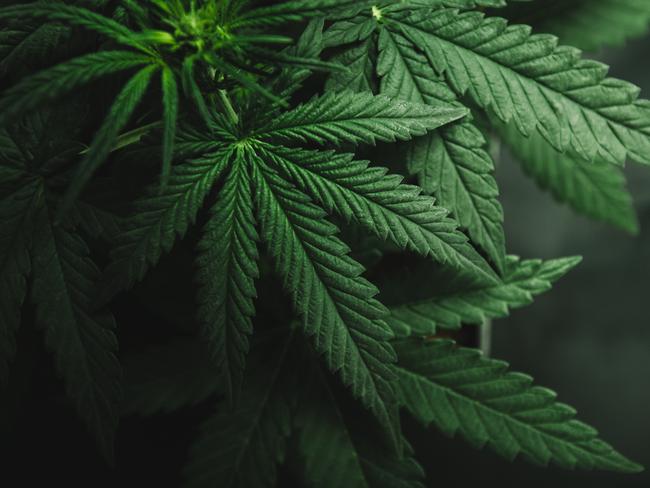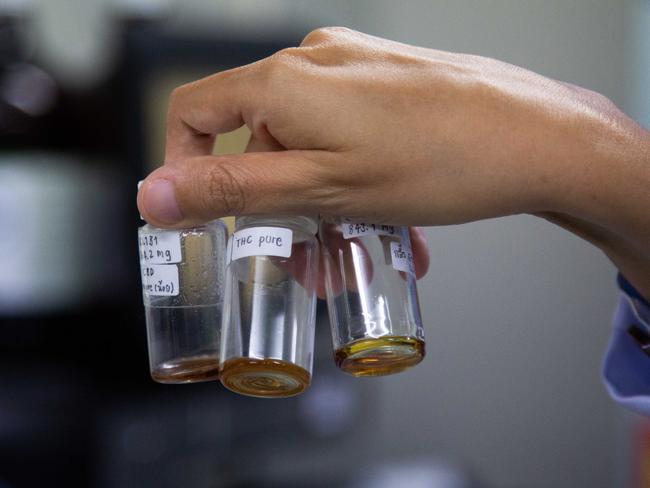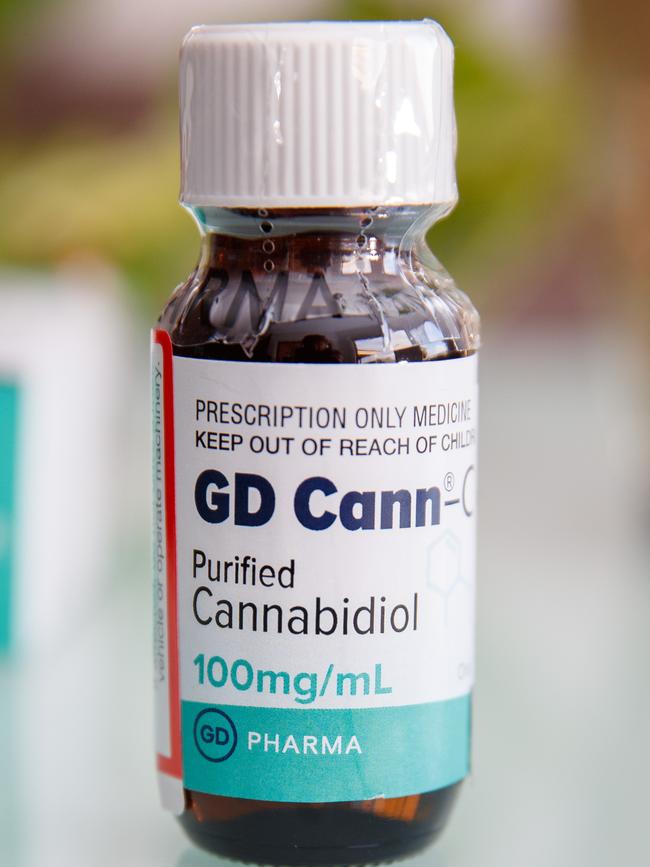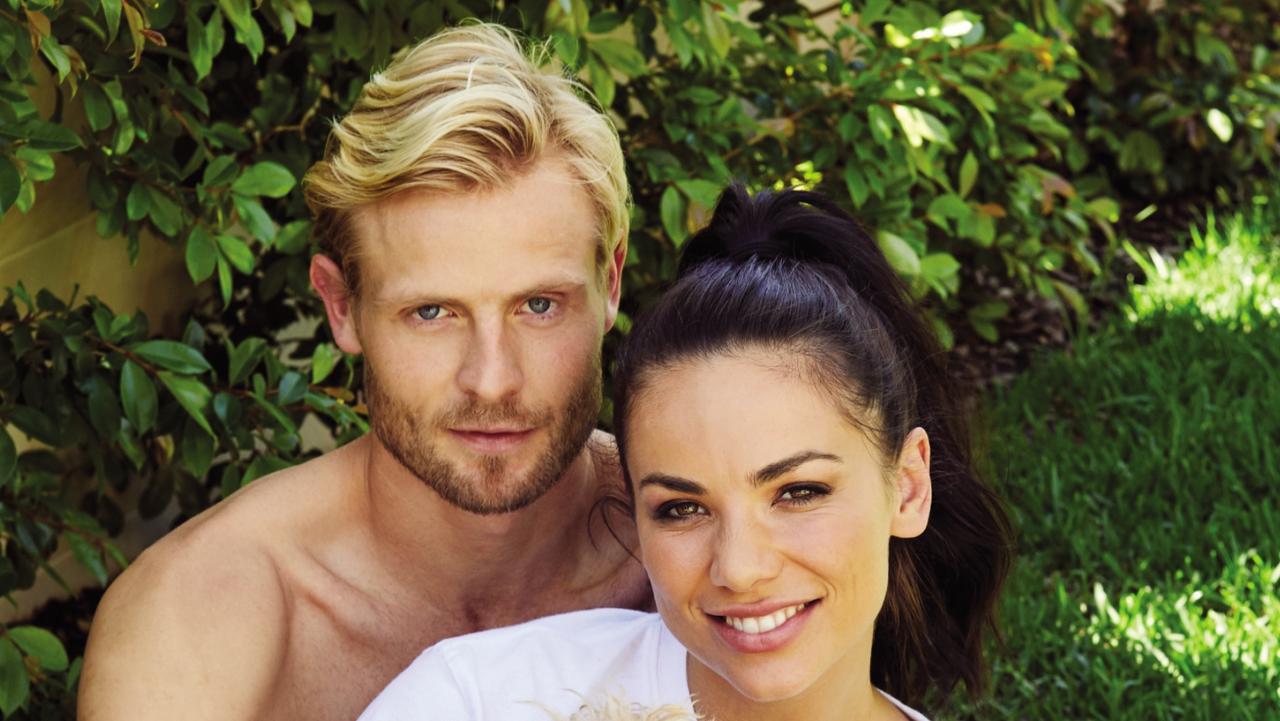Medicinal cannabis: Should CBD oil be more accessible in Australia?
It’s a huge hit in other countries but Australians’ access to cannabidiol oil is restricted. The experts debate whether it’s time to tweak the rules for a substance which has been shown to help health problems including chronic pain, anxiety, epilepsy and nausea related to chemotherapy.
Cannabidiol oil — a.k.a. CBD oil — is currently a huge health trend worldwide, and it’s gone mainstream.
In the UK, there’s reportedly more than 250,000 regular users and you can buy CBD skin care, ice cream, sweets and even water.
In the US, companies have put it in beer and Kim Kardashian even had a CBD-themed baby shower where she served CBD tea and had a beauty bar where guests could make their own CBD-infused beauty products.
In Australia, the oil is only available on prescription, which begs the question: are we behind the times and are Aussies missing out? Surprisingly, the experts say no.
“For safety and efficacy, I think Australia has a better system than the US and UK,” says Diandra Phipps from Tetra Health, a company helping Aussie patients access medicinal-cannabis products safely.

Even those in the industry — who you’d think would be frustrated by the barriers to supply — agree that Australia’s stricter laws are better.
“If you’re using CBD oil at a therapeutic dose, and by that I mean a dose high enough to actually treat a condition, you need regulation,” says Nicole Godresse, the general manager of medicinal-cannabis manufacturer Tilray.
Cannabidiol — one of around 100 active ingredients (called cannabinoids) in cannabis — can be extracted from hemp or marijuana, both plants in the cannabis sativa family.
It’s then put into a carrier oil to be consumed or used topically. It has an anti-inflammatory effect and in trials has been shown to help problems including chronic pain, anxiety, epilepsy and nausea related to chemotherapy.
MORE FROM BODY+SOUL:
Sober curious: Is life better without alcohol?
How to raise boys in the #metoo movement era
What it doesn’t do is get you high. The substance in cannabis that does is THC (tetrahydrocannabinol).
To be legally sold here in Australia, CBD oil must contain at least 98 per cent cannabidiol and less than 2 per cent of any of the 100 or so other cannabinoids found in cannabis.
There would only be a trace amount of THC — far too little to have any psychoactive effect.
To get your hands on legal CBD oil, you’d need to get a doctor’s prescription, but it’s not as simple as visiting your local GP and walking out with a vial of the stuff.
“CBD is mostly available via the Special Access Scheme,” explains Mary Nteris, a regulatory consultant to the pharmaceutical industry.
“A doctor applies through the scheme for a prescription on behalf of the patient, and approval can take between one day to two weeks.”
WHY DOSAGE MATTERS
The medicinal-cannabis industry is supportive of this approach.
“CBD is a powerful active ingredient that has clear effects on the body,” explains Godresse.
“The current stance helps ensure those effects are positive.”
One reason for those positive effects is that patients here know how much to use to get results.
The starting dose of CBD oil you need to help medical problems is 10-20mg, but can reach hundreds of milligrams for some conditions.
Many of the CBD products like water or ice cream sold in the UK contain far less than this, so as soothing as it sounds to be able to sip CBD water as you battle the crowds down London’s Oxford St, the fact that water may only contain 1mg of CBD oil means it’s unlikely to have any medicinal effect. And that’s if it even lives up to its claims!

A study by the UK’s Centre for Medical Cannabis found that 11 of 29 CBD products sold on the UK High Street contain only half the CBD they claim on the label.
One product, retailing at £90 (about $160), has none in it at all, and 45 per cent of the products also contain more THC than allowed by law, making them technically illegal.
Many of the products sold in the US and UK are also derived from hemp-seed oil but are often labelled as ‘CBD’.
“We have a lot of patients buying hemp oils with very little CBD in them,” says Phipps.
“While they may have some therapeutic benefit, as hemp-seed oil is quite healthy, if you’re looking to use CBD as a medicine, you’d be much better off using a prescription-based cannabis-derived oil that can supply the levels of CBD [you need to have medical benefits].”
The other reason experts are in favour of prescription-only CBD is that you’re also monitored medically while you take it.
While it doesn’t appear that CBD has any risk of addiction or major side effects, researchers still aren’t completely sure of the long-term effects.
“Another incredibly important issue is that CBD affects an enzyme in the liver that metabolises about 90 per cent of the medications we take,” Phipps explains.
“This could alter the dose of the medication you receive, which needs to be monitored by a medical professional. Someone buying it off the shelf has no such protection.”
HOW AUSSIES GET CBD OIL
Since its introduction to Australia in 2016, legal CBD oil has come under fire for being very hard to obtain.

One year ago, that criticism was still valid, but since then there’s been improvements to the regulation as well as the approval process, plus greater GP awareness.
In June 2019, 1576 CBD approvals were granted by the Therapeutic Goods Administration through the Special Access Scheme, compared to 188 in June 2018.
The system is by no means perfect, though, and it’s estimated around 100,000 Aussies are using CBD illegally as they either can’t find a doctor who’ll prescribe it, or can’t afford it.
According to Cannabis Access Clinics, the average legal user is paying about $370 a month (although those treating epilepsy, which needs very high doses, spend closer to $992), while those buying it illegally are spending about $297 per month. But Phipps says these prices should come down as more suppliers enter the market.
She adds that as research continues, legal CBD oil can be prescribed for a growing number of conditions.
If you decide to try and get CBD oil, your first stop should be your GP or specialist, who will then apply for a prescription on your behalf. If your doctor isn’t up to speed, a patient-advocate company like Tetra Health can help.
Whether one day we will end up like the US and the UK, selling CBD oil off the shelf, no-one knows for sure.
“With any new development in medicine there’s a level of conservatism, but as the evidence base grows around results, and the stigma around medicinal cannabis fades, there’s a chance things may change,” says Nteris.
We’ll be keeping a close watch on this story for any developments.


